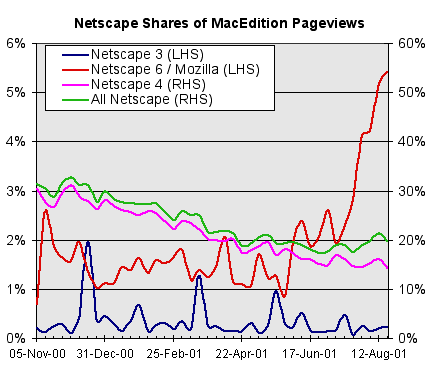Netscape’s baaa-aack
August 27, 2001
Feedback Farm
Have something to say about this article? Let us know below and your post might be the Post of the Month! Please read our Official Rules and Sponsor List.
Forums
Want to dig even deeper? Post to the new MacEdition Forums!
A few weeks ago, Netscape released Version 6.1 of the Mozilla-based Netscape browser.
Unlike the 6.0 and 6.01 releases, there were no howls of derision this time. Initially, I assumed that this was just because nobody cared any more. Version 6.0 had been such a dud that I figured everyone was once bitten, twice shy. Certainly I was: After many hours and several columns dissecting the performance of the various betas and the original 6.0 release, I just gave up tracking Netscape 6 and its Mozilla sibling closely. I’d keep my own copies up to date, but if I couldn’t use them for more than ten minutes without crashing, I wasn’t that interested. And anyway, the few CSS bugs left in Netscape 6 were trivial compared to the great gaping holes in OmniWeb’s CSS support. I had to prioritize.
Neither did Netscape/Mozilla gain much traction in browser market share. They’ve been barely a blip on the browser share data at TheCounter.com and Upsdell.com’s BrowserWatch. Even in MacEdition’s own stats, Mozilla 5 tags accounted for less than 2 percent of all pageviews for most of this year. MacEdition’s audience of professional Mac users tends to use newer browsers, and there’s a tendency amongst some Mac users to use non-Microsoft products on principle. So although Netscape had a better chance to succeeding in the Mac market than on Windows, Version 6 was struggling to gain a solid user base even there.
In part, this was because of the decidedly non-Mac user interface, but there were many other reasons that weren’t Mac-specific. Netscape 6.0 was slow, it was unstable, and it hogged way too much RAM. So as each new version came out – first 6.0, then 6.01, then the 6.1 beta – we saw very small spikes in usage, which petered out after a couple of weeks as people gave up in disgust.
Snatching survival from the jaws of irrelevance?
Then something happened. First, the 0.9.2 and 0.9.3 betas of Mozilla were released, and started being praised for their speed. People started noticing a decided improvement in stability, and the Mozilla team themselves claimed that their recent builds were now more stable than Netscape 4.x.
Once Netscape 6.1 came out, people really started to change their tune. You can see it in Webmasterbase’s and CNet’s reviews, and in the discussion at Tidbits. And although there are a few wackos using crazy arguments and obfuscation in an effort to bring the Mozilla project down, by and large this positive story is being played out in many places on the Web.
People are voting with their usage, too. We’re seeing it here on MacEdition, and I’ll bet you are seeing it on your sites, too. After nine months of hovering around 1 percent to 1.5 percent of pageviews, Netscape 6 and its Mozilla sibling have in the past four weeks substantially increased their share of MacEdition readership. The last two weeks’ numbers were above 5 percent, following the release of Netscape 6.1. The previous two weeks had been closer to 4 percent, showing that the Mozilla 0.9.2 and 0.9.3 betas had also been responsible for a pickup in its usage. I haven’t added up the different builds separately, but eyeballing the log reports by browser tag confirms that most Mozilla users are using at least 0.9, and that many users of Netscape 6.0 have upgraded to 6.1 already.

(Observant readers will notice that the history on the graph looks a bit different from the graph I presented in an earlier column. That earlier set of stats didn’t cover the whole site, and included some staff-only areas that the readers can’t see. I added the previously ignored public areas and removed the non-public areas from the data behind this newer graph, and removed known search engine robots from the totals. This has smoothed out the numbers considerably.)
Now, after being such a harsh critic of earlier versions of this browser, I’m hardly likely to turn around and say that this is the greatest browser ever. There’s still room for improvement. In particular, it still uses far too much RAM relative to other emerging browsers like iCab or Opera. But it does seem like the new Netscape is a contender again. To be honest, I had thought that nine whole months with a substandard, buggy browser would put people off for good. Maybe that’s assuming that people are less patient than they really are. Perhaps there are enough people out there who believe in having a choice of browsers, enough to give Netscape one more try.
As a Web author, I have to say I’m pleased about this development. Despite the glitches identified in my earlier columns and elsewhere, the Mozilla family of browsers has pretty good standards support – not only CSS but other key standards like the Document Object Model as well. If it was up to me, I’d want every current user of Netscape 4.x to switch over to Version 6 or its Mozilla sibling (or Opera, if they don’t have enough RAM). Certainly I’d rather see that than migration to OmniWeb, as it currently stands.
Browsers that support standards are what every Web author needs, and if it took Netscape until the 6.1 release to make a bearable browser, I guess it’s better late than never. I’ll be watching MacEdition’s stats closely over coming weeks, and I’d be interested to hear your experiences, either as a user or as a Web site operator. Is Netscape 6/Mozilla picking up share on your site? Drop me a line, or post a message in the Feedback Farm below.
